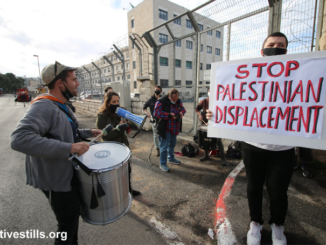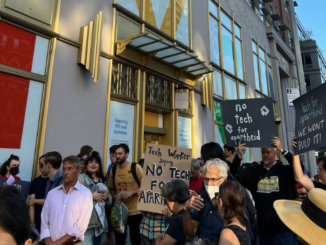
By Jeremy Salt
Airbnb has reversed its decision to ban some 200 listings by Zionist settlers in the West Bank while allowing them to continue in occupied east Jerusalem and the occupied and illegally annexed Golan Heights.
The decision against the listing of West Bank settlements was taken in conformity with Airbnb’s policies of non-discrimination and a commitment to inclusion and respect. Through its reversal, Airbnb has now committed itself to discrimination, exclusion, disrespect and contempt for international law.
Airbnb finally backed down after a “settlement” with Israel’s Shurat Hadin law center, representing the interests of American Jews ‘owning’ property in the West Bank. The center claimed that the ban violated the US government’s 1968 Fair Housing Act, extended now, apparently, to territory outside the US defined as occupied in international law. Pressure was also applied by Zionist lobby groups, by the government of Israel and by US state governments that have introduced anti-BDS legislation.
Within Palestine, as occupied since 1948 some 20,000 people use Airbnb. The Zionist ‘strategic affairs minister’ Gilad Erdem urged them to respond to the original Airbnb decision by boycotting the organization and some did.
Ron de Santis, Florida governor, and former member of Congress said 45,000 Floridians used Airbnb and threatened sanctions that would affect its operations in his state. De Santis also referred to possible violations of the “civil rights” of Floridians who “own” property in the West Bank.
He said Airbnb’s decision violated legislation passed in November 2018, imposing penalties on any company giving support to the BDS campaign. “We have a moral obligation to oppose the Airbnb policy. It does target Jews specifically and when you target Jews for disfavoured treatment that is the essence of anti-semitism. In Florida, as long as I’m governor, BDS will be D.O.A.”
In May, de Santis will lead a party of 80 to Israel where, in Jerusalem, he will preside over a full meeting of the Florida Cabinet. He described Israel as being “a tiny little country in a troubled part of the world standing for freedom, for democratic principles … really, the foundation of our civilization here in the United States, and really the western world, can be traced back to that little plot of land.”
Illinois governor Bruce Rauner called the original Airbnb decision “abhorrent” and a violation of his state’s anti-BDS legislation.
The Simon Weisenthal Centre said the decision “against Jewish homeowners” on the West Bank was anti-semitic. The ADL (Anti-Defamation League), Bnei Brith (‘sons of the covenant’), which describes itself as advancing human rights around the world, and a string of other Zionist lobby groups, also denounced the original decision and welcomed its reversal.
The back down by Airbnb is only the latest in a series of reversals on the occupied territories by governments and organizations. In 2017 Canada’s Federal Food Agency rescinded a decision that wine produced in the occupied West Bank and the Golan Heights could not be labeled as being produced in Israel.
This decision followed the passage of legislation by the Canadian federal parliament early in 2016 denouncing the BDS campaign. In May the Ontario state parliament followed suit by passing a “Standing Up Against Discrimination in Ontario” bill which described the BDS campaign as “anti-semitic” and prohibited all state agencies, including pension funds and universities, from any involvement in the BDS campaign.
The bill is a clear threat to freedom of speech as well as the right of universities to make independent choices on moral questions. The bill has been rejected by academics and students alike, with the Canadian Federation of Students defending the BDS campaign.
In Ireland, the government and the parliament came under heavy pressure from lobbyists to drop the Control of Economic Activity (Occupied Territories) Bill of 2018, submitted in conformity with the 4th Geneva Convention, which protects civilian rights in occupied territories and prohibits their settlement by an occupying power.
Under the bill, the import or sale of any goods or services from settlements in the West Bank would be illegal. Although opposed by the government, the Dail (the parliament) passed the legislation in late January 2019.
The reaction in the US was almost instantaneous. Ten members of Congress penned a letter threatening that the bill would have “broader consequences” on Ireland’s economic relations with the US. Supporters of the BDS campaign should now be boycotting Airbnb while giving thanks for the Irish.
– Jeremy Salt taught at the University of Melbourne, at Bosporus University in Istanbul and Bilkent University in Ankara for many years, specializing in the modern history of the Middle East. Among his recent publications is his 2008 book, The Unmaking of the Middle East. A History of Western Disorder in Arab Lands (University of California Press). He contributed this article to The Palestine Chronicle.

– Jeremy Salt taught at the University of Melbourne, at Bosporus University in Istanbul and Bilkent University in Ankara for many years, specializing in the modern history of the Middle East. Among his recent publications is his 2008 book, The Unmaking of the Middle East. A History of Western Disorder in Arab Lands (University of California Press). He contributed this article to The Palestine Chronicle.







